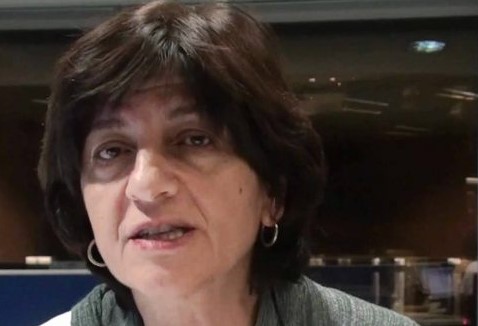21 grudnia 2017 r. poinformowano, że spis powszechny palestyńskich uchodźców doliczył się 174 422 osób w Libanie. Spis, nazwany „Ogólny spis rezydentów w obozach dla uchodźców oraz centrach populacji palestyńskiej w Libanie” i prowadzony przez około jeden rok, został wykonany we współpracy z Centralną Administracją Statystyczną Libanu i Centralnym Urzędem Palestyńskiej Statystyki pod auspicjami Komisji Libańsko-Palestyńskiego Dialogu (LPD)[1]. Spis przeprowadzono w następstwie decyzji rządu libańskiego z 25 sierpnia 2016 r. i po porozumieniu w tej sprawie podpisanym przez rządy libański i Autonomii Palestyńskiej (AP) 29 października 2016 r. W obozach dla uchodźców liczeni byli wszyscy mieszkańcy, a nie tylko Palestyńczycy; w pozostałych miejscach liczono tylko Palestyńczyków[2].
Poinformowano także, że Palestyńczycy skupiali się głównie (35,8%) w okręgu Sidonu, a następnie na północy (25,1%), w Tyre (14,7%), Bejrucie (13,4%), regionie Szouf (7,1%) i Dolinie Bekaa (4%). 72% mieszkańców obozów dla uchodźców było Palestyńczykami, w tym 65,4% wieloletnimi rezydentami w Libanie, a 7,4% niedawno przybyłymi z Syrii. W niektórych obozach było więcej nie-Palestyńczyków niż Palestyńczyków – na przykład, w obozie Szatilla 57% było syryjskimi uchodźcami, a tylko 29,7% Palestyńczykami[3].
Należy podkreślić, że jest to pierwszy spis palestyńskich uchodźców przeprowadzony w Libanie i że wyniki ujawniły mniejszą liczbę palestyńskich uchodźców niż poprzednio szacowano, oraz znacznie mniej niż liczba podawana przez UNRWA i ONZ. Dyrektor spisu, 'Abd Al-Nasser Al-Ayi, powiedział wychodzącej w Londynie saudyjskiej gazecie “Al-Hayat”, że część palestyńskich uchodźców wyemigrowała przez te lata z Libanu, głównie do Niemiec i do krajów “Zatoki Arabskiej”[4].
 Logo spisu powszechnego: „Spis powszechny rezydentów obozów dla uchodźców i w ośrodkach palestyńskiej populacji w Libanie – główne wyniki, 21 grudnia 2017” (Źródło: Twitter.com/LPDCommittee, dostęp, 10 lutego 2018)
Logo spisu powszechnego: „Spis powszechny rezydentów obozów dla uchodźców i w ośrodkach palestyńskiej populacji w Libanie – główne wyniki, 21 grudnia 2017” (Źródło: Twitter.com/LPDCommittee, dostęp, 10 lutego 2018)
Reakcje na spis: Podkreślanie palestyńskiego prawa powrotu, obawy przed permanentnym osiedleniem uchodźców w Libanie
Wyniki spisu, który, jak powiedziano, ujawnił mniejszą liczbę palestyńskich uchodźców niż poprzednio oceniano, wywołał różne reakcje w Libanie między politykami i publicystami oraz ogólne obawy, że spis miał na celu przygotowanie gruntu dla permanentnego osiedlenia palestyńskich uchodźców w Libanie.
Libański premie, Sa’d Al-Hariri, życzliwie przyjął wyniki spisu mówiąc, że została ujawniona prawda o liczbie palestyńskich uchodźców w kraju, co było przedmiotem wewnętrznej debaty: “To jest rzeczywista liczba… Niektórzy mówili o 500 tysiącach, 600 tysiącach lub 400 tysiącach [palestyńskich uchodźców]… Kilku [wśród nas próbowało] siać panikę [w tej sprawie]. Słyszeliśmy wyższe liczby wykorzystywane w [celach] politycznych i w sporach [z rywalami], ale Komisja LDP ustawiła sprawy na właściwym miejscu; rząd rozpoczął ten spis i dzisiaj mamy poprawne wyniki”.
Dodał: „Jest naszym obowiązkiem wobec naszych palestyńskich braci, którzy żyją na naszej ziemi, że ich sprawa musi być wolna od sporów… zarówno między Libańczykami, jak Palestyńczykami… Nie ma miejsca na wieloznaczność, ani żadnej [możliwości] permanentnego osiedlenia [ich w Libanie], ani żadnego innego kroku, który sprzeczny jest z prawem powrotu [Palestyńczyków] lub wykorzenienia palestyńskiej tożsamości z Palestyńczyków”[5].
Po opublikowaniu wyników spisu przewodniczący Komisji LDP, dr Hassan Mneimneh, wezwał do dania uchodźcom ekonomicznych i społecznych praw: “Jesteśmy przekonani, że solidarność z Palestyną [znaczy] solidarność z poszczególnym Palestyńczykiem, [co obejmuje] zachowanie jego godności i jego prawa powrotu. Tak więc nadszedł czas przyznania Palestyńczykom w Libanie ekonomicznych i społecznych praw… Komisja LDP będzie działać z całą swą mocą, by osiągnąć to na następnym etapie”[6].
Przywódca libańskich Druzów, Walid Jumblatt, tweetował o swoim zdumieniu wobec decyzji przeprowadzenia spisu w tym czasie, wyraził obawę, że będzie permanentne osiedlenie palestyńskich uchodźców w Libanie i napomykał, że jest to związane z oświadczeniem prezydenta USA, Trumpa, że Jerozolima jest stolicą Izraela oraz z większą umową: „Ostatecznie, dowiedzieli się, że liczba Palestyńczyków w Libanie nie jest większa niż 174 tysiące. Co jest dziwne i niepokojące w tej historii, to dlaczego przeprowadzili spis w tym czasie. Czy było to w celu zakończenia [całej] sprawy permanentnym osiedleniem uchodźców [w Libanie]… żeby zniknęło prawo powrotu razem z Jerozolimą?” [7]
Neemtallah Abi Nasr, przewodniczący Partii Chrześcijańskich Demokratów, także miał zastrzeżenia do spisu, wyrażając obawy, że miał na celu permanentne osiedlenie uchodźców w Libanie: “[Spis]przeprowadzony przez libańską Centralną [Administrację] Statystyczną wzbudza obawy i pytania. Prawda o nim musi zostać ujawniona i ta absurdalna sprawa musi zostać zatrzymana, bo szkodzi prawu powrotu i libańskiej konstytucji, która zakazuje permanentnego osiedlania [palestyńskich uchodźców]”[8].
Artykuły libańskich publicystów także odzwierciedlały obawy, że mała liczba uchodźców znaleziona przez spis doprowadzi do ich permanentnego osiedlenia w kraju; inni argumentowali, że jest możliwe danie im społecznych i ekonomicznych praw.
Poniżej podajemy fragmenty [nie spolszczone] dwóch artykułów prezentujących te argumenty:
Senior Lebanese Journalist: The Census Was Aimed At Permanently Settling The Palestinian Refugees In Lebanon
Ghassan Hajjar, editorial board director at the Lebanese Christian daily Al-Nahar, explained the fear in Lebanon that the census constituted preparation for permanently settling the Palestinians in the country, which, he said, would negatively impact the demographic balance. The census results, he added, had shown a smaller number of refugees than estimated, and this would facilitate the implementation of such a solution. Hajjar hinted at the possibility that the U.S. is behind a plan to permanently settle the Palestinian refugees in the countries where they now reside, including Lebanon, and thus to eradicate the problem of the Palestinian refugees, particularly in light of President Trump’s declaration that Jerusalem is the capital of Israel. He wrote:
„The numbers are important but what is more important is their exploitation, and the preparation of the ground for dubious, or foreign, projects…
„Since the release of the census [results] showing that only 174,000 Palestinians live on Lebanese soil, there have been reports indicating the disappearance of the 'demon’ of the Palestinian refugees in Lebanon. [Prime Minister] Sa’d Al-Hariri has confirmed this, saying, 'In the past, when discussing the number of Palestinian refugees in the country, we would inflate [these numbers] and give very high numbers’… [and also pointed out that] 'The LPD Committee settled these matters and the Lebanese government launched a census and now we have the results.’
„This is the first census conducted by official Lebanese-Palestinian decision since the [Palestinian] refugees arrived [in Lebanon] 70 years ago… The questions and doubts about this project and its results are necessary and pressing…
„First of all, it is not clear why a Palestinian element, not a Lebanese element, conducted the census. What was the role played by the Lebanese Central [Administration of] Statistics in the census? Was the census conducted only in the [Palestinian] refugee camps?…
„Second, there is the question about why [the census was conducted] at a time when the U.S. is trying to expropriate Jerusalem [for Israel], to eradicate the Palestinian refugee problem, and to persuade the countries in which they live to find permanent solutions for them – that is, permanently settle them, even if they call it something else.
„Third, according to UNRWA [data], the number of Palestinian refugees in Lebanon in early [1948] was 127,600. According to the December 2008 census, they numbered 422,188. A 2015 joint UNRWA-American University in Beirut study found that the number of refugees in Lebanon was between 260,000-280,000. But no one is explaining the lower number. Where did they go? Was their departure documented by General Security at the official border crossings?
„Whether the number [of Palestinian refugees] is actually 174,000, as the census stated, or is much greater, the absolute opposition to permanently settling them [in Lebanon] must not change.”[9]
 Ghassan Hajjar (Source: Facebook.com/ghassanhajjarlb, January 2, 2018)
Ghassan Hajjar (Source: Facebook.com/ghassanhajjarlb, January 2, 2018)
Call For Civil Rights For Palestinian Refugees After Census Reveals Their Small Number
In an article in the London-based Qatari daily Al-Arabi Al-Jadid, Lebanese journalist Randa Haidar criticized the Lebanese regime, calling it „hypocritical” for claiming to support Palestine and Jerusalem while at the same time not working for the good of the Palestinian refugees in Lebanon. She also called on the Lebanese regime to apologize for inflating the refugee numbers in the past and to give them fundamental civil rights. She wrote:
„The State of Lebanon, its governments past and present, and its official institutions must apologize to the Palestinians in Lebanon for the lies they disseminated by inflating the numbers of the refugees [in Lebanon] and for using these [inflated] numbers for fearmongering and for ethnic and racist incitement against them, and as a pretext for stripping them of their fundamental civil rights. Now it has emerged that the number of Palestinians in Lebanon is not 400,000, which the [Lebanese] Foreign Minister Gebran Bassil has repeated over and over, but 174,422, according to the census conducted by the LPD Committee and the Central Administration of Statistics in Lebanon.
„Since the [1948] Nakba, and since the Palestinians found refuge in Lebanon, the Lebanese governments have been on the alert to thwart the international attempts to settle them permanently in Lebanon – [attempts] that have increased since the 1950s – for two main reasons: One, the obvious reason, is to protect the Palestinian people’s right to return to its own land and to thwart the Zionist plan to solve the Palestinian refugee problem by permanently settling them in the countries hosting them. Another reason, which is implied, is the impact that settling the Palestinians, most of whom are Muslims, will have on the delicate demographic balance in this country. This balance forms the basis for the complex formula for the distribution of political authorities according to ethnic group.
„In contrast to other Arab countries, [where the Palestinian refugees] are permanent residents of the country, Lebanon is refraining from giving them civil rights, and has treated them as foreigners belonging to a special sector… Accordingly, the civil rights of the Palestinians in Lebanon can be interpreted in various ways and according to arbitrary and discriminatory laws, for which the Palestinians have paid the price – particularly the residents of the refugee camps, which have become [areas] of poverty and shortage.
„It is not possible, of course, to ignore the fact that the armed activity of the Palestinian organizations in Lebanon since the early 1970s, the Israeli wars against the Palestinians in Lebanon, and the Palestinians’ involvement in the Lebanese civil war that broke out in 1975 have impacted the dispute that divided the Lebanese into [two main groups:] a leftist-Muslim public supporting the Palestinian resistance to Israel based on Lebanese soil, and a right-wing-Christian public that opposes this. This dispute reached its height with the 1982 Israeli invasion of Lebanon, and in light of the armed Christian militias’ collaboration with the invaders.
„These dark, bloody historical eras have left a deep impression on the relationship between the Palestinian refugees and the Lebanese public and state institutions. With the passage of time, the fearmongering about the Palestinian presence and about the [possibility] that they will be settled permanently became an axe to be used for political purposes connected to elections, and for disseminating a policy of racism against all non-Lebanese.
„It is not only the Palestinian public in Lebanon that has paid the price of this fearmongering vis-à-vis permanently settling the Palestinians. Lebanese [women] married to foreigners have paid a high price, in that their children are not given Lebanese citizenship, on the claim of fear of permanent settlement of the Palestinians. Although no more than 3,000 Lebanese are married to Palestinians, Lebanese Foreign Minister Gebran Bassil sees this as a danger to Lebanon… Does giving citizenship to the children of three thousand Lebanese married to Palestinians constitute an existential danger for Lebanon?
„Although the law prevents a third generation of Palestinians born in Lebanon from engaging in the free professions, such as engineering and medicine, and also gives them no property rights – not to mention a series of complications connected to… renewing residence and work [permits], and despite the fact that they constitute a tiny part of the total population of Lebanon – despite all this, political elements continue to support not giving them their rights, in order to make things more difficult for them.
„The Palestinian refugees in Lebanon need their civil rights more than they need the fiery speeches of support for Palestine and Jerusalem given by Lebanese officials in Arab and International circles. Today, Lebanon’s hypocrisy vis-à-vis the Palestinians on Lebanese soil and towards the Palestinian issue is no longer acceptable, particularly not after the recent release of their [actual] numbers there and the refutation of the exaggerations that there have been in matters connected to them. The publication of the real number of Palestinians in Lebanon must be a real turning point in the official establishment’s treatment of the Palestinian refugees, and they should be given civil rights forthwith, as promised by the Lebanese prime minister. „[10]
 Randa Haidar (Source: madardaily.com)
Randa Haidar (Source: madardaily.com)
[1] Lpdc.gov.lb, December 21, 2017.
[2] Al-Hayat (London), February 3, 2017; http://www.lpdc.gov.lb.
[3] Al-Mustaqbal (Lebanon), December 21 and 22, 2017.
[4] Al-Hayat (London), December 21, 2017.
[5] Al-Mustaqbal (Lebanon), December 22, 2017.
[6] Al-Mustaqbal (Lebanon), December 22, 2017.
[7] Twitter.com/walidjoumblatt, December 22, 2017.
[8] Al-Nahar (Lebanon), January 3, 2018.
[9] Al-Nahar (Lebanon), December 23, 2017.
[10] Al-Arabi Al-Jadid (London), December 24, 2017








